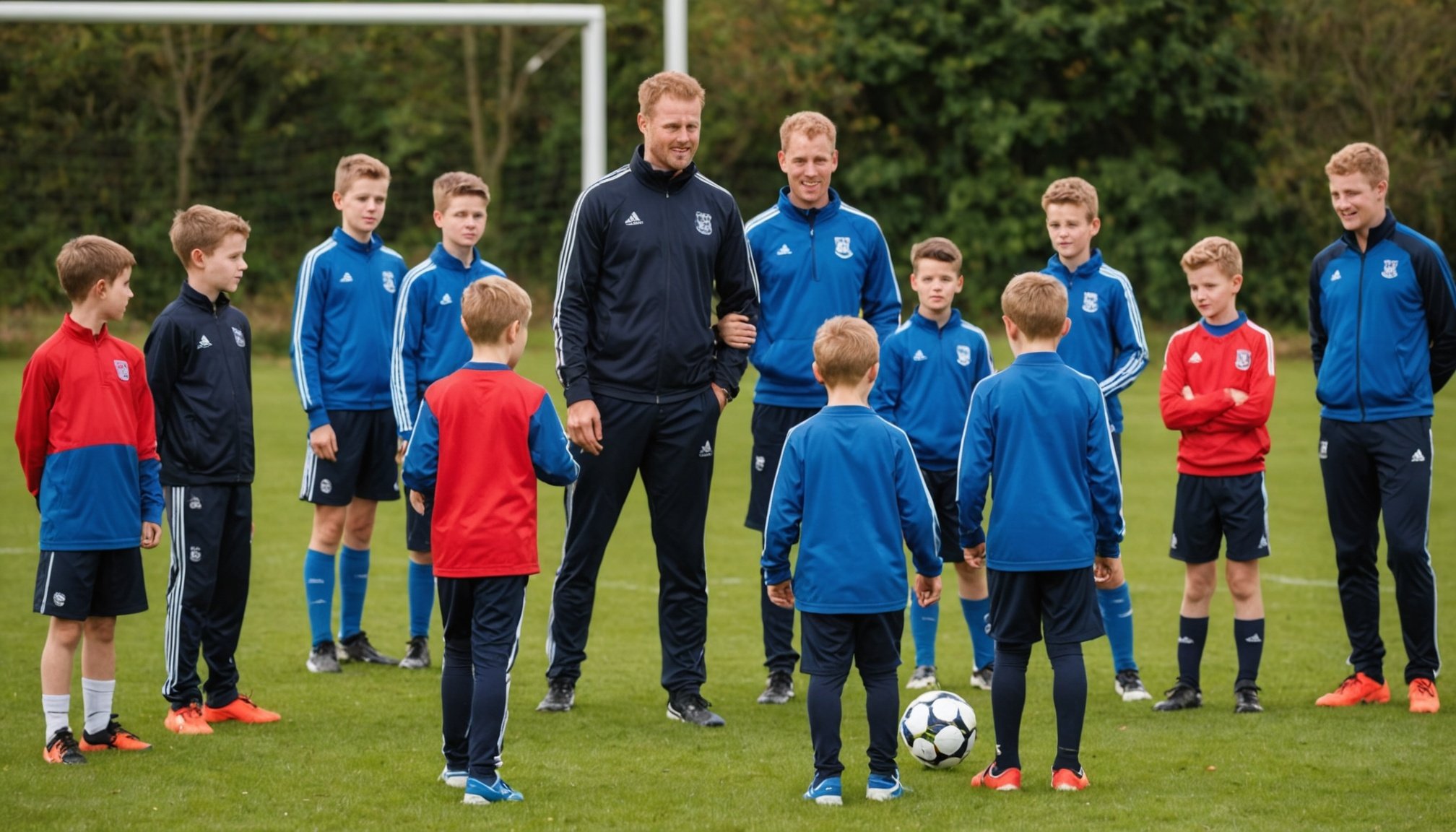Communication Skills
Effective communication skills are fundamental for coaching young athletes. Establishing an environment where athletes feel heard and understood is crucial. Techniques for fostering open lines of communication involve creating a welcoming atmosphere in which athletes are encouraged to share their thoughts and experiences. This can be achieved through regular team meetings and check-ins, allowing young athletes to voice their concerns and celebrate successes.
Engaging athletes in conversation requires active participation from both parties. Active listening plays a pivotal role in building trust within the coaching relationship. This involves truly understanding what the athlete is conveying and responding empathetically. By showing genuine interest, coaches can build stronger connections with their athletes.
Also read : The definitive playbook: winning tactics for uk sports clubs to boost sponsorship success
Delivering constructive feedback is another indispensable component of successful coaching. It should focus on specific behaviours and offer clear, actionable suggestions. Instead of only pointing out what went wrong, effective feedback balances areas for improvement with recognition of achievements. This approach not only enhances performance but also boosts athlete confidence.
To truly excel, coaches must master these communication skills, providing athletes with the support needed to develop both on and off the field. Building respectful, open lines of communication can foster more engaged and motivated young athletes.
Have you seen this : Key components to design an effective training program for triathletes in the uk
Coaching Philosophy
Establishing a clear coaching philosophy is essential for guiding young athletes in their sporting journey. This framework is not merely about winning games but imbuing athletes with positive life skills. By prioritising youth sports values, coaches can promote teamwork, discipline, and resilience. These values are integral in developing well-rounded individuals who respect opponents and embrace fair play.
A thoughtful coaching philosophy encourages athlete development by aligning training methods with the athletes’ physical and emotional maturity. Recognising that young athletes progress at different rates, effective coaches adapt their strategies to match various developmental stages. This approach ensures that athletes are neither overburdened nor underchallenged, optimising their growth.
Incorporating sportsmanship within coaching practices fosters a supportive and safe environment. Encouraging young athletes to value participation over competition nurtures their self-esteem and well-being. Emphasising integrity within sport, by demonstrating respect for all participants, cultivates a sense of community.
Aligning a coaching philosophy with broader life lessons prepares athletes for challenges well beyond the field. Coaches who successfully integrate these core principles help athletes develop both technically and personally, nurturing not only proficient players but also confident and principled individuals who carry these lessons throughout life.
Training Techniques
In youth sports, employing effective training techniques is vital for fostering skill development. Tailored practice design not only enhances athletes’ abilities but keeps them engaged by including fun activities.
For an effective practice design, integrating a blend of drills and games specific to the sport can pique young athletes’ interest. This structured approach ensures skill acquisition while maintaining enjoyment. Moreover, employing short, focused sessions can hold their attention better, facilitating gradual improvement.
Engagement doesn’t stop with fun alone; assessment methods are crucial for tracking skill progress. Coaches should employ a variety of evaluation strategies, ranging from observational assessments to performance benchmarks. This comprehensive approach provides insights into an athlete’s strengths and areas that may need additional focus.
Integrating these strategies into training ensures not only proficiency in skills but also maximizes an athlete’s development potential. The benefits extend beyond the immediate sports arena by instilling a love for physical activity and a solid work ethic, underpinning lifelong habits. Adapting methodologies for younger groups by incorporating enjoyable, age-appropriate practices not only maintains interest but encourages consistent participation in sports. This balance between skill and engagement ultimately leads to more well-rounded, motivated athletes.
Safety Protocols
Ensuring youth sports safety is paramount, and implementing effective safety protocols is essential in protecting young athletes. Coaches should prioritise injury prevention by adhering to structured safety guidelines during all sports activities. This includes regular equipment checks to ensure they meet safety standards and are suitable for the athletes’ age and skill levels.
Education on first aid is crucial for coaches to respond promptly and appropriately to injuries. Coaches must be well-versed in basic first-aid techniques and injury management to minimise risk and provide initial care when needed. Conducting regular safety drills also prepares athletes for unexpected situations, reinforcing a culture of caution and preparedness.
Moreover, safeguarding children in sports settings involves more than just physical protection. Creating an environment where children feel emotionally and psychologically safe is critical. Implementing protocols such as background checks for all staff and promoting an inclusive atmosphere where young athletes are respected and valued contributes to the overall safety of the sports environment.
By instilling a strong foundation of safety protocols, coaches not only mitigate risks but foster an atmosphere where young athletes can enjoy sports confidently and securely, knowing their well-being is a priority.
Inclusivity in Coaching
Creating an inclusive environment in youth sports is crucial to ensuring all athletes feel valued and accepted. To achieve this, coaches should implement strategies that actively promote inclusivity.
Firstly, understanding and addressing barriers to participation for underrepresented groups is essential. Common obstacles include limited access to resources, financial constraints, or lack of representation. Coaches can mitigate these by offering scholarships, reaching out to diverse communities, and engaging with parents to create a supportive network around the athlete.
Embracing diversity within the team fosters a nurturing and accepting atmosphere. This involves recognising and celebrating differences in culture, ability, and background. Coaches should tailor their approach to accommodate varying needs, ensuring everyone has an equal opportunity to succeed.
Another key element is youth sports access for athletes with different abilities. Coaches should adapt training and facilities to be accessible and safe for all participants. Additionally, providing diversity training for coaching staff is a practical step in enhancing understanding and empathy.
By creating a welcoming environment, coaches not only enrich the sports experience for every athlete but also instill valuable life lessons on respect and unity. Inclusivity strengthens the team, promoting a sense of belonging and a shared commitment to mutual support.
Successful Case Studies
By examining coaching success stories in youth sports across the UK, we gain valuable insights into effective programming. These case studies highlight key elements contributing to their success, providing practical lessons for adoption in new strategies.
One exemplary case is the inclusion of holistic development programs that go beyond physical skills. These programs integrate youth sports values such as teamwork and resilience, reinforcing positive behavior both on and off the field. As demonstrated, structured environments where athletes are encouraged to embrace sportsmanship foster positive attitudes and better performance.
Moreover, successful programs often involve aligning coaching methods with athlete development stages. By acknowledging varying maturity levels, coaches implement appropriate challenges that neither overwhelm nor bore young athletes. This incremental approach ensures sustained engagement and growth over time.
Another valuable lesson is the importance of parental involvement and community support. Cases show that when parents and community members are actively involved, young athletes exhibit increased motivation and satisfaction. Coaching philosophy focused on inclusivity and community building creates a support network that amplifies program effectiveness.
These insights underline the need for continuous learning and adaptation, ensuring youth coaching remains dynamic and impactful for developing proficient, well-rounded athletes.
Practical Tips for Coaches
Coaches play a pivotal role in fostering both athletic and personal growth. Here are top practical tips for youth sports management:
-
Plan: Structure each session with a clear focus, balancing skill drills and game situations to keep athletes engaged.
-
Communicate Effectively: Use clear and positive language to convey instructions. Ensure athletes understand the objective of each exercise and encourage open dialogues to address any queries.
-
Adaptability: Be flexible in your approach. Tailor activities to suit the varying skill levels within your team, providing additional challenges for advanced players and support for those who need it.
Resources for continual learning are vital for enhancing coaching effectiveness. Investing in training advice such as workshops and books offers new insights and strategies. Online courses help coaches stay updated with the latest methods and best practices in youth sports.
Balancing competitive objectives with athlete personal growth is crucial. Emphasise effort and improvement over winning, creating a nurturing environment. Celebrate small victories and consistent work ethic, reinforcing a growth mindset.
Incorporating these tips can lead to more satisfying experiences for both coaches and athletes, building a strong foundation for future success in sports and beyond.
Resources for Further Learning
Continuing growth as a coach involves engaging with dedicated coaching resources. Investing in professional development ensures that coaches remain informed about innovative techniques and approaches within youth sports. Recommended reading materials include books that delve into effective coaching methodologies and strategies. These can provide fresh insights and broaden perspectives.
Furthermore, enrolling in specialised courses and workshops enhances the practical application of new skills. Many organisations offer coaching certifications, fostering credibility and competency among youth sports coaches. Online platforms also serve as invaluable tools, delivering a plethora of resources, from instructional videos to comprehensive articles addressing diverse coaching aspects.
Keeping abreast of evolving training materials is key to adapting in dynamic sports settings. Coaches are encouraged to seek materials that focus on both technical skill enhancement and the nurturing of sportsmanship and ethics. This dual emphasis supports the development of athletes as well-rounded individuals.
By utilising a variety of educational sources, coaches can ensure that their techniques remain current and effective. Such dedication to continual learning not only enhances the coaching experience but also enriches athlete development, aligning with broader objectives of fostering resilience and sportsmanlike conduct in young athletes.











